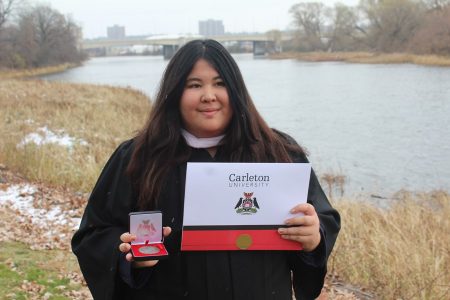Grad Research: Understanding Autistic People’s Privacy and Safety Online

Jessica Rocheleau, a PhD student in Cognitive Science is focusing her research on understanding autistic people’s privacy and safety online.
This research builds off of Rocheleau’s master’s thesis in Human-Computer Interaction which investigated autistic and non-autistic teenagers’ privacy attitudes and behaviours on social media, and identified factors influencing their privacy and safety online.
Says Rocheleau: “Within the past few decades, more autistic people are using the Internet to promote their community’s rights and needs; however, this increased online presence heightens safety threats like discrimination and harassment.”
She aims to investigate autistic self-advocates’ experiences with preventing and coping with online safety threats and the role of intersectionality on autistic self-advocates’ online safety.
“My interest in the autistic self-advocacy in online platforms comes from my own journey with discovering my identity as an autistic person, based on my experiences conducting autism research and connecting with the #ActuallyAutistic community on social media over the past four years,” shared Rocheleau.
Her research will help to shed light on the challenges that autistic people experience with safety online resulting in the development of solutions to make the Internet a more inclusive place for this population.
Rocheleau is designing this study to be as inclusive for autistic people as possible. “I will recruit autistic adults who engage in autism self-advocacy online to give feedback on the project and research materials through a short online survey and a video or instant messaging interview over the Internet. I will implement the recommended changes, and then in Phase 2, I will recruit autistic self-advocates to complete the main part of the study, which includes an interview and online survey about their safety online.”
Dr. Sonia Chiasson from the School of Computer Science and Dr. Kasia Muldner from the Department of Cognitive Science have been supervising Rocheleau throughout this research.
“I can always count on them to provide me with detailed feedback and recommendations on all phases of my research work, from initial brainstorming to publication,” shared Rocheleau. “They are also very positive and encouraging – they help to boost my morale when I feel discouraged about my work and motivate me to keep moving forward when I hit a setback. I’m extremely grateful to both of them for their support over the years.”
Rocheleau is in the process of recruiting for this research with the aim of sharing her findings through peer-reviewed articles, presentations at scientific conferences, local autism organizations, and social media posts.
“My dream is for inclusive research to be the norm, rather than an afterthought,” said Rocheleau. “A fellow PhD student and I are working on starting a group that will be dedicated to respectful and inclusive autism research at Carleton. We hope that this group will help put Carleton on the map as an ally to the autistic community and a supporter of the neurodiversity movement.
The PhD student continued: “I hope that this research will help to change the general public’s views on autism. Autism is not a terrible, tragic disorder that makes people naïve to safety threats and incapable of protecting themselves online. It’s a type of neurodiversity that makes people vulnerable to safety threats online because of society’s lack of awareness, understanding, and acceptance towards it. Therefore, it’s up to us as a society to work towards making both the real and digital world more compassionate and accepting of diversity so that autistic people can thrive.”